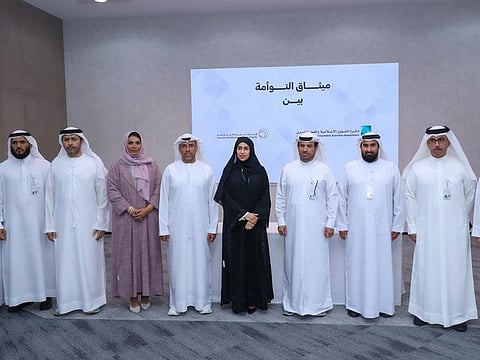New community initiative to support vulnerable groups in Dubai
CDA, Islamic Affairs & Charitable Activities Department sign twinning charter pact

Dubai: The Community Development Authority (CDA) in Dubai, entrusted with crafting community development frameworks in the emirate, has entered into a twinning charter agreement with the Islamic Affairs & Charitable Activities Department in Dubai to enrich the quality of life of citizens and enhance the happinees of vulnerable community segments.
The agreement was endorsed by Hessa Bint Eisa Buhumaid, Director General of the Community Development Authority in Dubai, and Ahmed Darwish Al Muhairi, Director General of the Islamic Affairs & Charitable Activities Department in Dubai, in the presence of several high-ranking leaders and officials from both entities.
This agreement is part of the collaborative efforts and twinning initiatives between the two entities, aligning with the Dubai Social Agenda 2033. The objective of the agreement is to enrich the quality of life and welfare of citizens, enhancing the happiness of all vulnerable community segments among residents of Dubai. It seeks to bolster governmental initiatives by offering proactive services, empowering vulnerable groups, and optimising the resources of both entities to fulfill the goals of the Dubai Social Agenda 2033. Additionally, it aims to align indicators, initiatives, and collaborative projects that reinforce strategic objectives within the purview of both the authority and the department, including cooperative efforts to enhance and innovate societal services.
Hessa Bint Eisa Buhumaid said, “This agreement solidifies our ongoing collaboration with the Islamic Affairs & Charitable Activities Department in Dubai, enabling us to offer assistance to eligible groups and strategically invest zakat funds in Sharia-compliant avenues that uplift the well-being and quality of life of community members.”
Ahmed Darwish Al Muhairi said the shared objectives includes the examination and financial support of humanitarian cases through zakat funds, charitable contributions, and donations, utilising resources from the department or other financial avenues to assist the most vulnerable groups in society, whether these groups are within the lines of entitlement or outside it.
The twinning charter will also enable the establishment of electronic connectivity, standardisation of databases in compliance with Dubai’s laws and regulations, ensuring the confidentiality of information. Moreover, there was a harmonisation of social concepts and standards, alongside conducting studies and projects aimed at enhancing the income sources of the most vulnerable families and safeguarding them from any harm.






